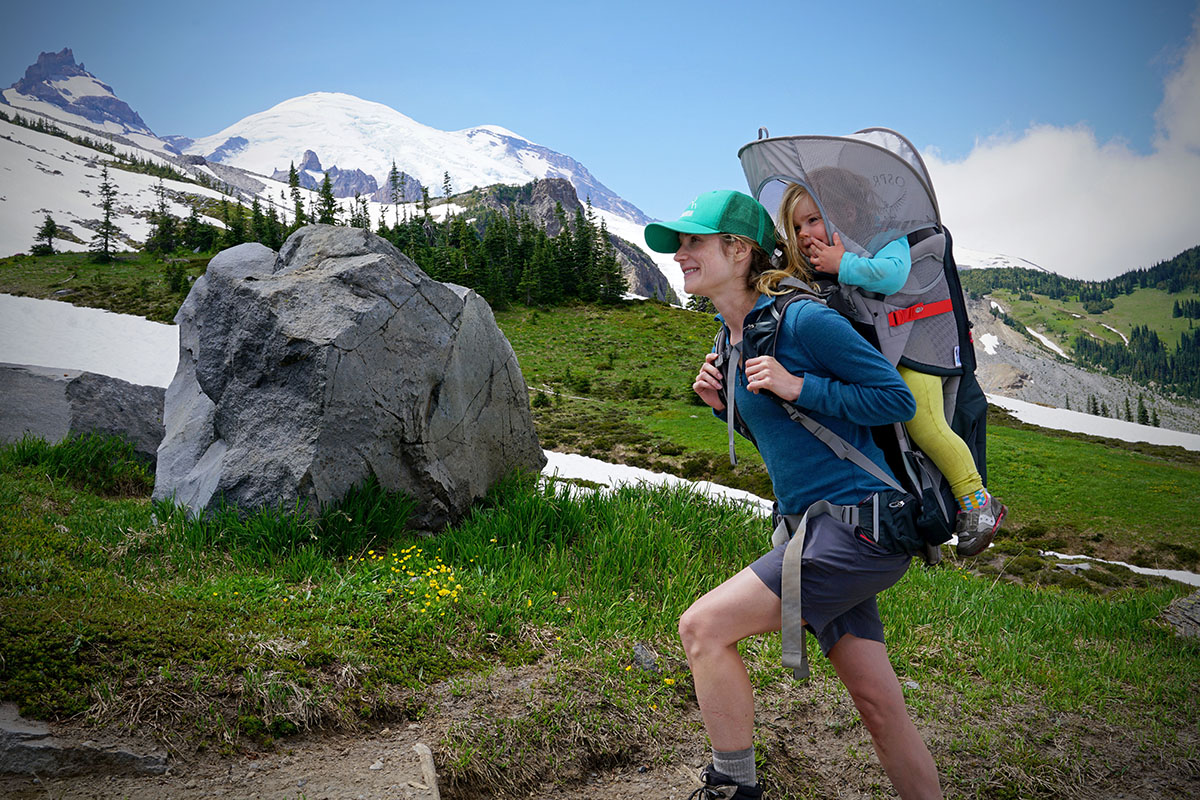
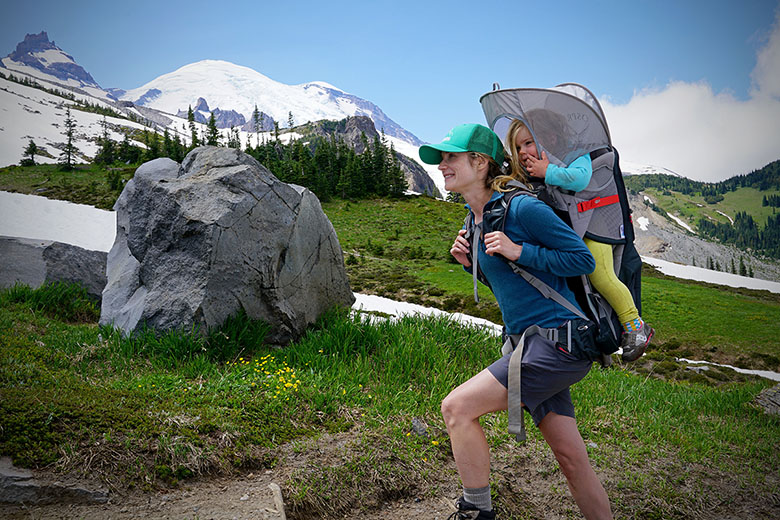
Switchback Travel


Switchback Travel
For hitting the trail with a little one in tow, it’s hard to beat a baby carrier pack. Their supportive designs allow for a comfortable and safe ride, and we’ve spent countless hours hiking with both a happy child and adult. Because of their feature-rich builds, including quality harnesses, padding, and suspension systems, these backpacks can be pricey, but there are deals to be had. Below we break down the top child carrier packs of 2025, which range from substantial backpacks that are strong enough for hauling a growing toddler to lightweight, frameless models for short trips. For more background information, see our comparison table and buying advice below the picks, along with details about our testing process.
Editor’s note: We updated this guide on April 28, 2025, to add Osprey’s Poco Soft as our favorite frameless baby carrier, bumping the pricier but less capable Ergobaby 360 Mesh down several spots in our rankings. As always, we also swept the guide to ensure all information was current at the time of publishing.
 Category: Comfort pack
Category: Comfort pack
Weight: 7 lb. 1.9 oz.
Capacity: 14L
Sunshade: Yes
What we like: Premium build quality; very comfortable for both child and adult
What we don’t: Pricey; sunshade offers limited protection along the sides.
Deuter’s Kid Comfort earns our top spot for 2025 by combining high levels of comfort and safety, premium build quality, and a practical organization layout. Deuter packs are known for their well-built suspension systems, and the latest model is a standout: It has a sturdy metal frame that easily handles a growing (and active) child, and the padded hipbelt and mesh backpanel mix support and ventilation very nicely. Further, we think Deuter has one of the best child seat designs out there. The buckling process isn’t as simple as the Osprey Poco below, but the five-point harness is very secure and easy to adjust. Plus, the tall back, supportive sides, and plush, washable front pad make for great mid-hike naps (and easy cleanup after).
As the mid-range model in Deuter's Kid Comfort lineup, this pack comes well appointed. The sunshade deploys quickly and has a dedicated pocket behind your back, there’s sufficient storage for most day trips (although it comes up well short of Osprey’s $75-pricier Poco Premium below in this respect), and the side entry option is useful for toddlers who want to load and unload on their own. The main challenge is cost: At $320, it’s a large investment, especially for those who only plan on occasional use. We're also a bit disappointed that the sunshade offers limited protection along the sides, which can be an issue on windy days. But overall, the Kid Comfort is a great match for families who get outside a lot with durable, high-quality materials and class-leading comfort for both baby and adult.
See the Deuter Kid Comfort
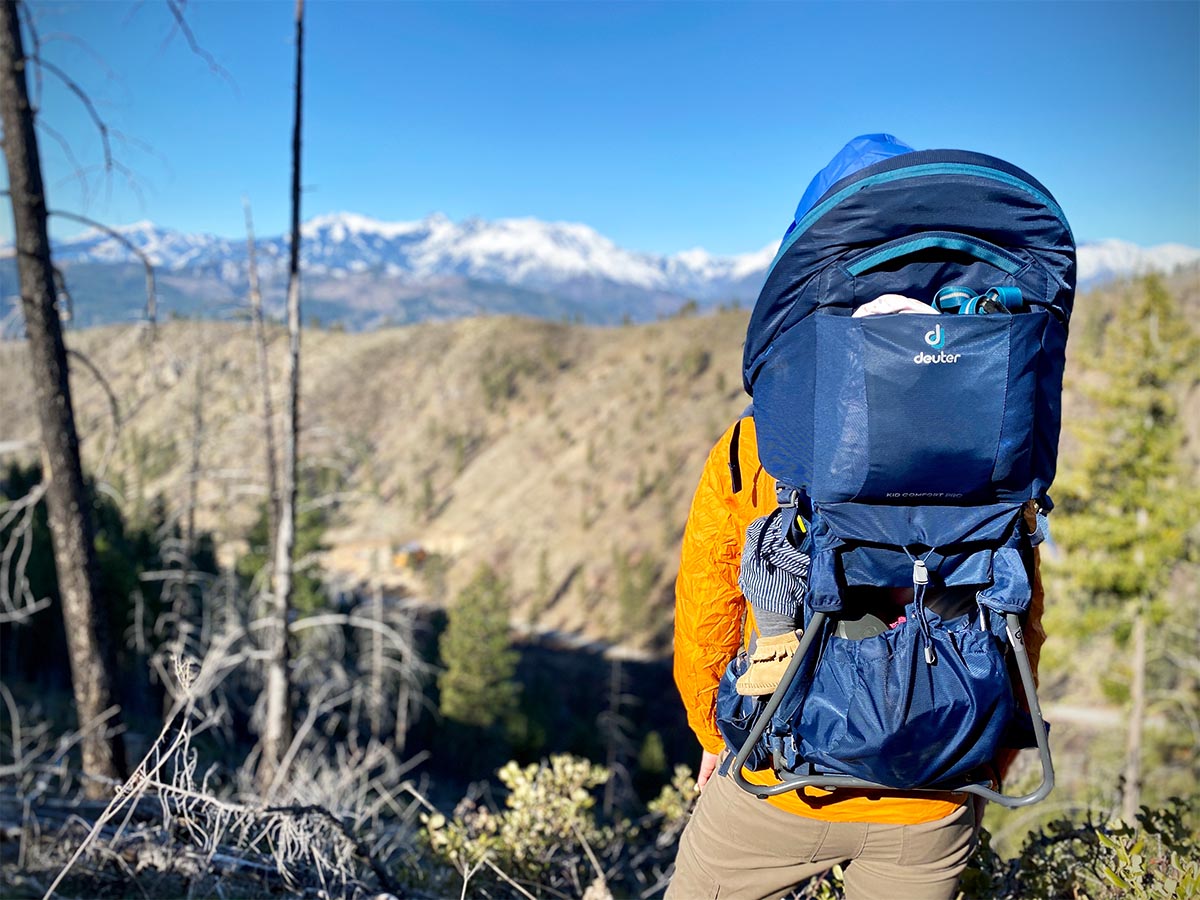
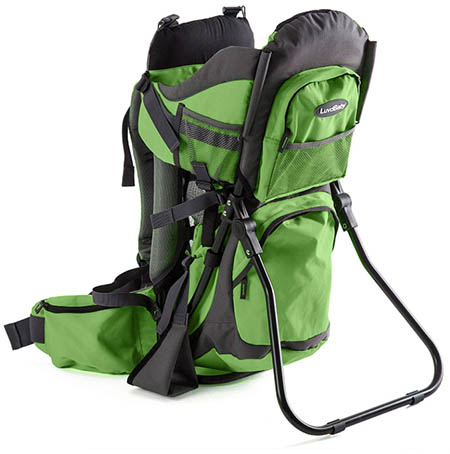 Category: Comfort/lightweight pack
Category: Comfort/lightweight pack
Weight: 6 lb. 7.0 oz.
Sunshade: Yes
What we like: Lots of features for around half the price of our top pick.
What we don’t: Drop in comfort for longer adventures; so-so build quality.
Child carrier packs are an expensive bunch, so it’s notable when you can find a solid value. LuvdBaby's Toddler Carrier Backpack is just that, packing many of the features found on high-end offerings from Deuter, Osprey, Thule, and Kelty at around half the price or less. Currently $175 on Amazon in multiple colors, the pack includes an integrated sunshade, hipbelt pockets, and an aluminum kickstand that locks for loading and unloading. Further, unlike the ClevrPlus carrier below, the LuvdBaby doesn’t look or feel as cheap, with sturdy ripstop polyester covering the body of the pack. For occasional use, short day hikes, or those simply looking to save, the LuvdBaby can do the trick.
Not surprisingly, the lower price tag does come with a few compromises. To start, the pack has cheap padding on the shoulder straps and hipbelt that becomes less comfortable as the day wears on (and as your baby grows). Additionally, the 40-pound weight capacity (including baby and gear) falls short of the 48- to 50-pound ratings of premium alternatives. But we keep coming back to value: Compared to Kelty's entry-level Journey PerfectFit ($270) below, the LuvdBaby includes more features—the Kelty omits hipbelt pockets and a sunshade and has less zippered storage—at a much lower cost.
See the LuvdBaby Toddler Carrier Backpack
 Category: Comfort pack
Category: Comfort pack
Weight: 8 lb. 5.4 oz.
Capacity: 36L
Sunshade: Yes
What we like: Leaves little to be desired for gear-intensive outings, including generous storage, an extensive feature set, and great fit customization.
What we don’t: Overkill in both price and capacity for occasional hikers.
From day hiking to backpacking, Osprey makes some of our favorite packs. Their popular Poco line has been a mainstay in this article for years, and they gave it a significant revamp in 2024. Replacing the Poco Plus as the top-end model, the Poco Premium is about as well appointed as baby carrier packs come: Starting with capacity, you get a whopping 36 liters of gear storage (a sizable 10L jump over the past-generation Poco Plus), which is great for everything from long day hikes to overnight treks with the family. Features abound, too, including an adjustable and well-ventilated backpanel, a removable and easy-to-launder cockpit, a quality sunshade, and plenty of secure storage. The Poco Premium is also the only option in the line to include Osprey’s Fit-on-the-Fly hipbelt, which allows you to tweak the location of the padding to maximize comfort.
What’s not to like with Osprey’s most feature-rich child carrier? First is its $395 price tag, which is the steepest on our list and limits the pack’s overall appeal. Avid hikers and backpackers may find the investment worth it, but those who only hit the trails occasionally can save significantly with an option like Deuter’s Kid Comfort above or Osprey’s standard Poco below. Unsurprisingly, the Poco Premium is also the heaviest option on our list at over 8 pounds, and we don’t love the large and stiff grab handle, which occasionally pushes against the back of your neck when you look up the trail (this is mostly an issue on inclines). Taken together, the Poco Premium isn't as versatile as the Kid Comfort above or Poco below, but the added capacity and no-holds-barred feature set have their appeal for committed outdoor-goers.
See the Osprey Poco Premium
 Category: Lightweight/comfort pack
Category: Lightweight/comfort pack
Weight: 5 lb. 9.0 oz.
Capacity: 25L
What we like: Lightweight, impressively packable, and includes a sunshade.
What we don’t: Not as great for hiking as it is for travel and everyday use.
At the opposite end of the spectrum from the Poco Premium above is Osprey’s Poco LT. As its name indicates, the focus here is on keeping weight to a minimum, and the pack has been built with packability and simplicity in mind. The thin frame and smaller profile allow it to fold nearly flat—a big plus for travel and around-town adventuring—and weight is very competitive at just over 5 and a half pounds. We’re also happy to see that Osprey didn’t trim away key features like generous storage (25 liters total), hydration reservoir compatibility, and a deployable sunshade.
One sacrifice Osprey made in simplifying the Poco pack is carrying comfort for extended stretches on the trail. The LT’s AirScape backpanel, thin padding, and minimalist stainless-steel frame can’t match the rigidity and support of the pricier Poco models, especially when hauling a full load. We also found exterior storage to be lacking, although we appreciate that the latest design comes with stirrups (the past-generation Poco LT did not), which we’ve found to be a handy feature for older kids and longer hikes. In the end, the Poco LT is still less of an all-rounder than our top picks, but it's a practical solution for everyday and travel uses. Of note: Osprey also offers the Poco SLT for $250, which is the lightest option in the collection at just 4 pounds 11.5 ounces but sacrifices 3 liters of storage compared to the LT and omits a sunshade and hipbelt pockets.
See the Osprey Poco LT
 Category: Lightweight pack
Category: Lightweight pack
Weight: 1 lb. 10.9 oz.
Capacity: 0L
Sunshade: Yes
What we like: Coveted Osprey comfort and quality in a lightweight, compact package.
What we don’t: Limited support and structure—this isn’t a great primary pack.
By this point, it should be fairly obvious that Osprey dominates the hiking-focused baby carrier space. The third option from their venerable Poco collection to make our list this season is the Poco Soft, which is frameless by design. This makes it very lightweight at just 1 pound 10.9 ounces, and the lack of structure allows it to pack down easily for storage. You also get the choice between three carry positions: face-in front carry for newborns, face-out front carry for infants with head and body control, and back carry for children around 12 to 36 months old (the pack's load range is 7 to 33 lb.). And despite the clear focus on minimalism, we appreciate that Osprey retained handy features like removable drool pads, a deployable sunshade with a dedicated stash pocket, and a padded headrest that folds away when not in use.
It shouldn’t come as a surprise that there are a number of downsides to the decidedly streamlined Osprey Poco Soft. To start, the lack of frame means it’s less comfortable over long distances and offers very little in the way of storage—you just get the sunshade pocket at the front and a hipbelt pocket with dual openings for stashing small items like a phone or pacifier. Additionally, by keeping the baby close to you, you aren’t able to move as freely, and it’s easy to get sweaty when working hard (the mesh backpanel and hipbelt help, but it still runs much warmer than the designs above). In the end, we consider the Poco Soft to be a nice complement to a true child carrier, but it’s not the single answer for most hiking families. For an even lighter (1 lb. 7 oz.) but more streamlined option, check out Osprey’s Poco Soft LT ($120).
See the Osprey Poco Soft
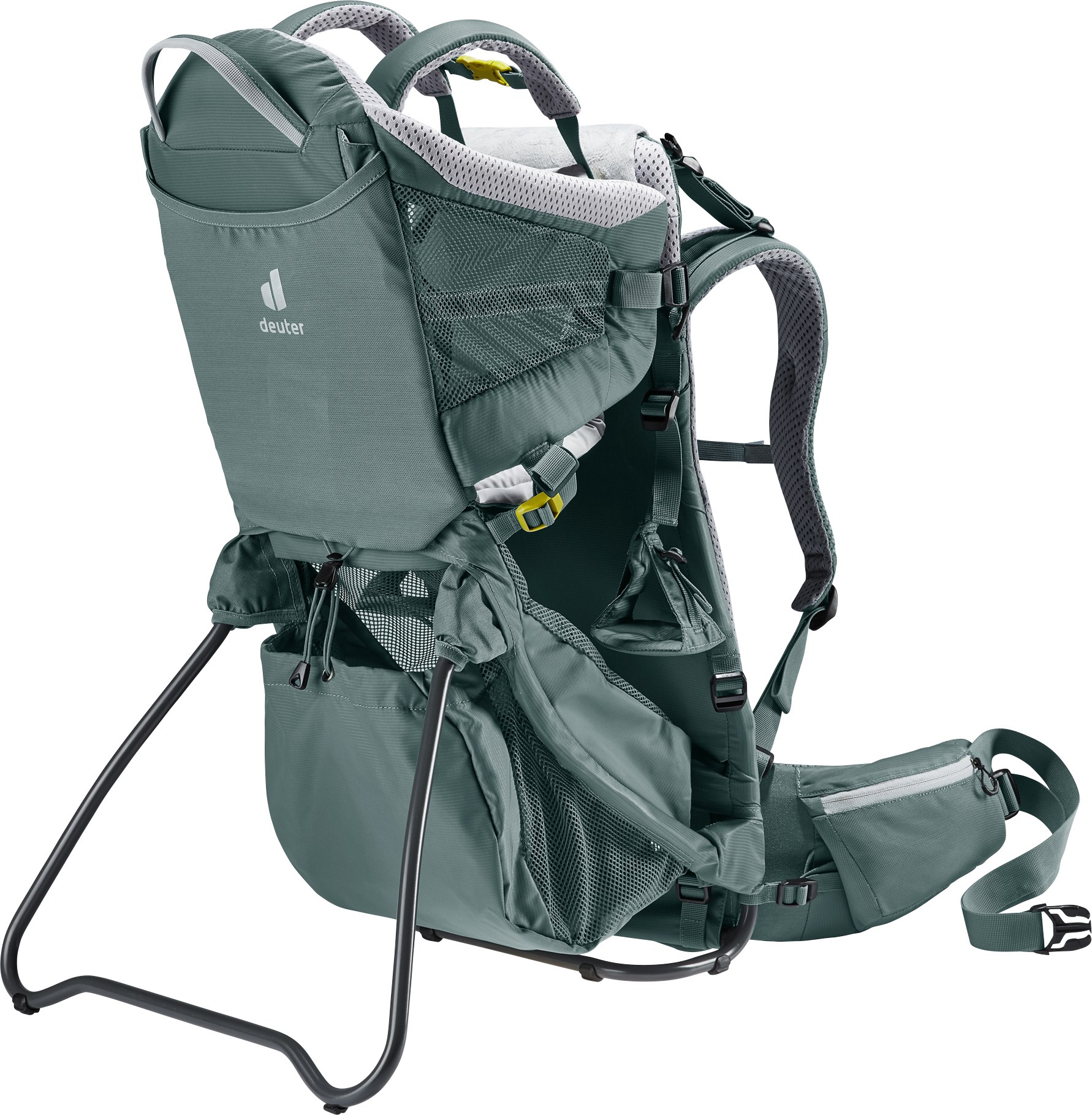 Category: Comfort/lightweight pack
Category: Comfort/lightweight pack
Weight: 5 lb. 14.6 oz.
Capacity: 12L
Sunshade: No
What we like: Well ventilated, lightweight, and now offered in a women’s-specific version.
What we don’t: Not as comfortable as the Comfort above and doesn’t include a sunshade.
Like the Kid Comfort above, Deuter’s Active model (previously the Comfort Air) got a fairly recent revamp. The lightweight and minimalist design hasn’t changed dramatically, and there’s still a strong emphasis on ventilation with extensive use of mesh around the backpanel and baby’s seating area. And Deuter didn’t skimp for the most part on the rest of the pack: The Active has the same side entry as the Comfort, a well-designed five-point harness system, and an easily adjustable suspension with a 48-pound rating. It’s also the only design here to be offered in a women's-specific version (called the Kid Comfort Active SL), which fits smaller torso sizes and includes narrower shoulder straps and an ergonomically shaped hipbelt.
The ventilated Comfort Active is a great choice for those who hike in warm environments, but we think the standard Comfort above is the better all-rounder. Considering the focus on staying cool, it’s odd that Deuter didn’t include a sunshade (it can be purchased as a $35 accessory). Moreover, you lose the extra-thick front drool pad and hydration reservoir compatibility, plus the trimmed-down suspension doesn’t carry a heavy load (or toddler) as well. Despite the complaints, if you need a women’s-specific fit or prioritize a lightweight and airy build, the Comfort Active remains a solid option.
See the Deuter Kid Comfort Active See the Women's Kid Comfort Active SL
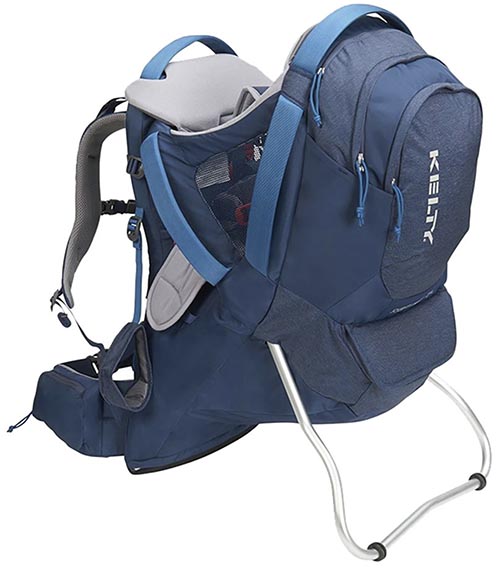 Category: Comfort pack
Category: Comfort pack
Weight: 7 lb. 4.0 oz.
Capacity: 26L
Sunshade: Yes
What we like: Easily adjustable suspension, reasonable weight, and nice feature set.
What we don't: Can’t match the top-rated Deuter in carrying comfort.
In the past, Kelty has fallen short at the deluxe end of the kid carrier market, but they’re aiming to change that with the latest Journey series. Available in base, mid-range Signature, and high-end Elite options, the focus is on comfort for both adult and baby. The “PerfectFit” in the name is for the torso adjustment system, which allows you to quickly dial in the fit by pulling on two straps at the backpanel (the torso size range is pretty wide at 15.5 to 21 in.). And the interior has been upgraded from prior versions of the pack, with a wide child seat and nice touches like a removable drool pad and stirrups.
What differentiates the three Journey PerfectFit kid carriers? The $290 base model below is pretty barebones, omitting a sunshade and organizational features like hipbelt pockets and a lower zippered compartment. Stepping up to the $350 Signature and $380 Elite gets you a build that stacks up well with the Osprey and Deuter packs above. Both Kelty carriers have large 26-liter capacities and lots of storage, and the Elite’s extras—including a hydration reservoir sleeve, mesh side pockets, and an easier-to-clean lining inside the lower compartment—are worth it for families that get out a lot. In the end, the Kelty still can’t match the premium cushioning and hauling comfort that you get with the top-rated Deuter, but its larger capacity (the Deuter is only 14L) is useful for full days on the trail.
See the Kelty Journey PerfectFit Elite
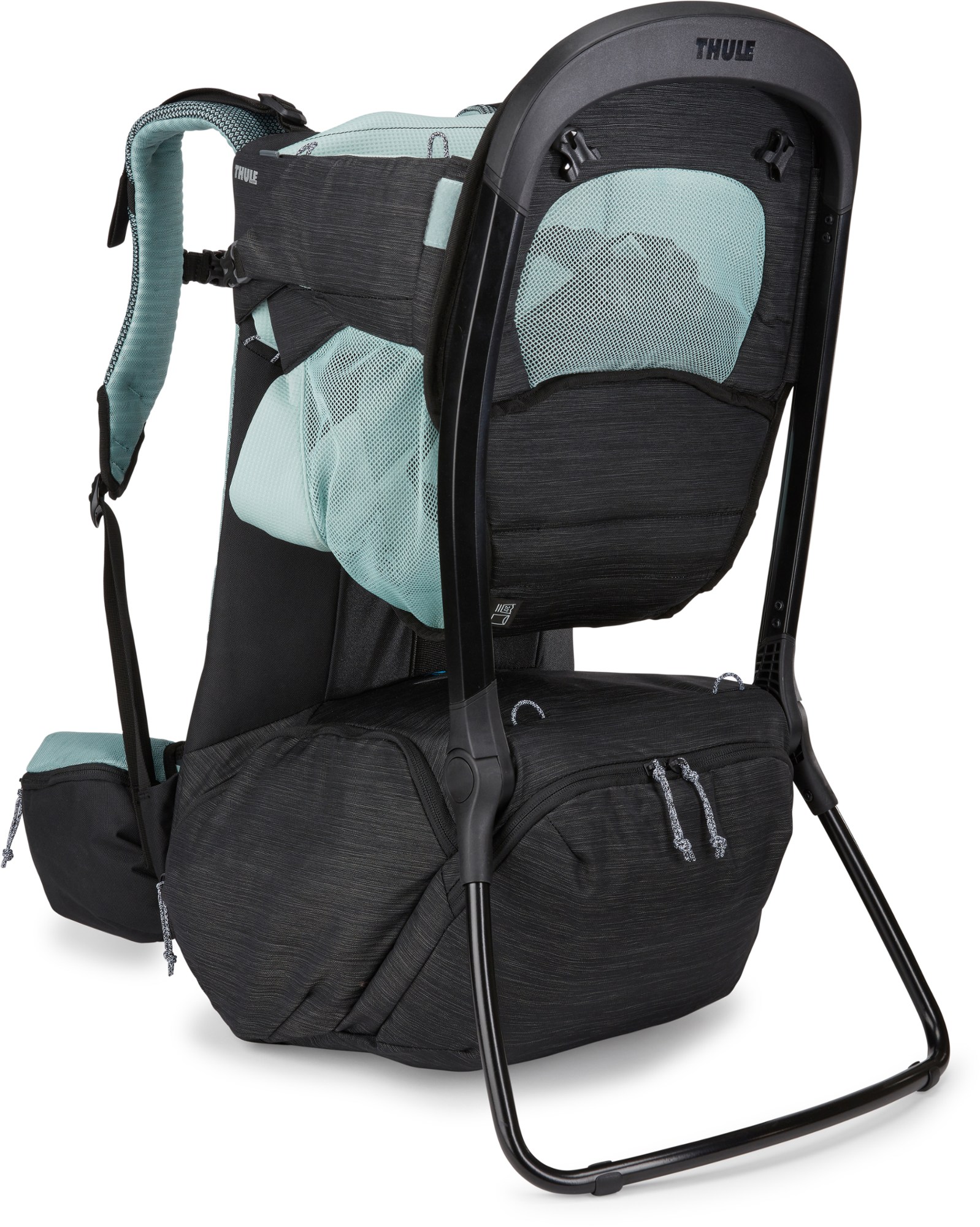 Category: Comfort pack
Category: Comfort pack
Weight: 7 lb. 0 oz.
Capacity: 22L
Sunshade: Yes
What we like: Excellent storage; unique hanging child seat that’s also washable.
What we don’t: Expensive and more Velcro in the design than we’d like to see.
Thule is best known for their car rack systems, but they’ve made inroads in the pack market over the past few years. The Sapling is their second effort at a child carrier, and the latest version targets top-of-the-line options from Deuter, Osprey, and Kelty. Highlights of the thoroughly reworked Sapling include a hanging mesh child seat that’s washable (an uncommon feature in this space), simplified construction that keeps weight in check, and urban styling that sets it apart from the more hiking-focused competition. In use, the Sapling has proven to be user-friendly, with lots of fit adjustments for both baby and adult, and its organization is among the best on the market with 22 liters of total space.
What’s keeping the Sapling from earning one of our top picks? For one, it's one of the priciest on the market at a steep $380. Additionally, we have some concerns about longevity. In particular, it strikes us that Thule is relying a bit too much on Velcro in the design: The backpanel has long strips of the material for adjusting the torso height, and it’s the same story for securing the drool pad along the sides. For those spending time on dusty and dirty trails, you can expect grime to work its way into those spaces and the Velcro to lose its stickiness over time (notably, Osprey, Kelty, and Deuter all utilize more reliable strap systems on the backpanels). That said, if you don’t plan to take your child carrier too far into the backcountry and instead prioritize storage, washability, and versatility—a Sapling Sling Pack ($50) is offered, which boosts capacity by 10L—Thule’s Sapling is well worth a look.
See the Thule Sapling Child Carrier
 Category: Comfort pack
Category: Comfort pack
Weight: 7 lb. 11.0 oz.
Capacity: 24L
Sunshade: Yes
What we like: Trusted Osprey build quality at a solid value.
What we don’t: Less storage and not as adjustable as the Poco Premium.
Osprey’s Poco sits below the Poco Premium in their kid carrier lineup, but it’s arguably the better value for the feature set. The pack has the same excellent kid seat design and mesh backpanel that ventilates well and is easy to adjust. It also retains a built-in sunshade, a removable drool pad, adjustable stirrups, and ample storage for all-day outings—including 10 liters of additional gear capacity compared to the Deuter Kid Comfort above. It’s all wrapped up in a very comfortable and well-built package that exudes Osprey’s typical attention to detail.
What do you sacrifice with the base Poco pack? First, you get a simplified hipbelt design that trades zippered pockets for much less practical mesh, and you aren’t able to adjust the padded portion of the hipbelt like you can with the Poco Premium above. This trimmed-down model also has less overall storage, although its 24-liter volume stacks up very competitively in the market. As long as the diminished fit customization and features aren’t dealbreakers, Osprey’s Poco is a really nice hiking option. But for $30 less, we still think the top-rated Deuter is the better all-around value and performer.
See the Osprey Poco
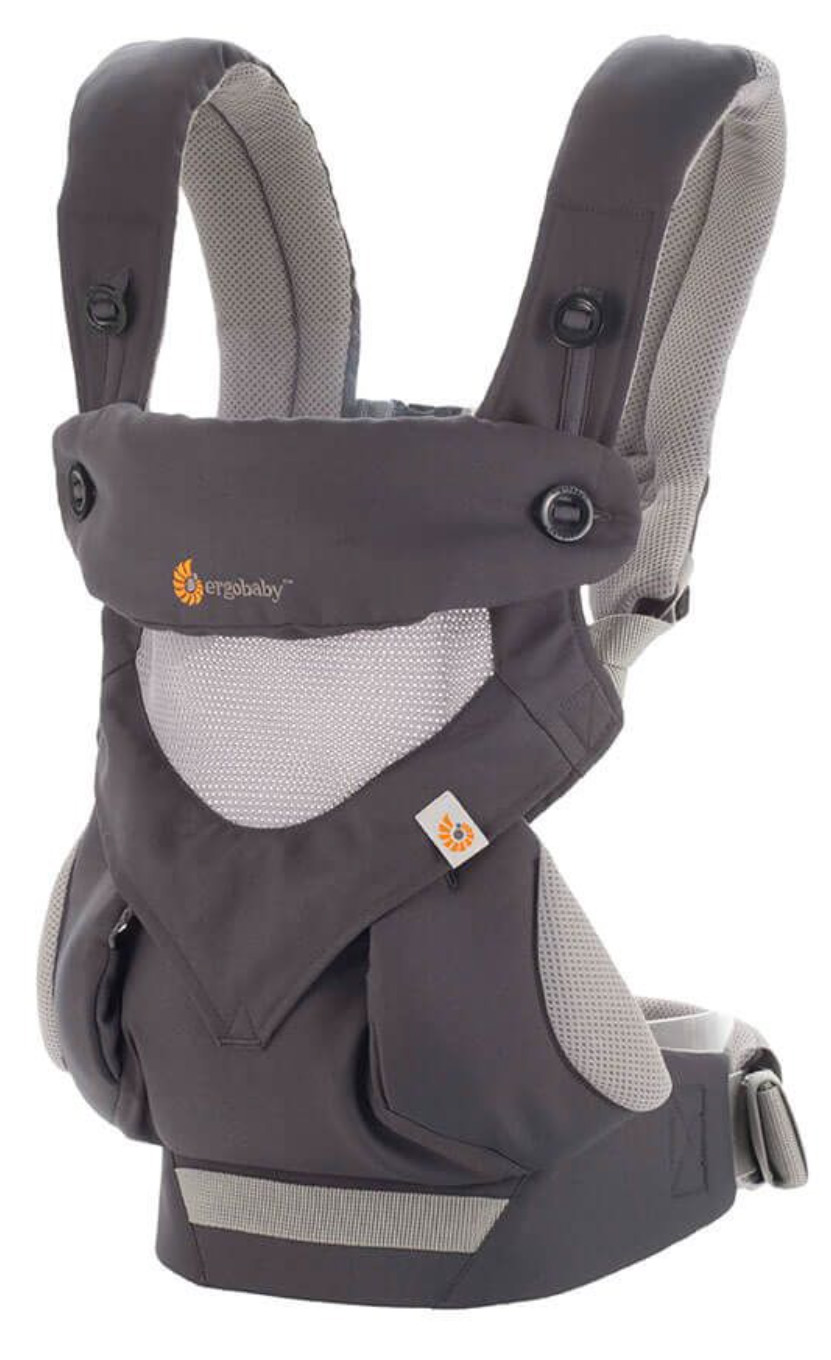 Category: Lightweight pack
Category: Lightweight pack
Weight: 1 lb. 8.0 oz.
Capacity: 0L
Sunshade: Yes
What we like: Superlight and packable; great for young kids.
What we don’t: Frameless design is limiting for hiking.
Most of the models above are dedicated hiking packs, but for cold weather or with small children, a simple baby carrier can be ideal. In the same category as Osprey’s Poco Soft above, the Ergobaby 360 Mesh is a classic choice with a comfortable waistband and a number of carrying options for a child. For hiking and travel purposes—and when baby is old enough to hold up their own head—the rear backpack-style position is what we’ve found to be most comfortable on the move. Another plus of the Ergobaby is its compact size, which makes it much easier to haul around than a typical child carrier.
Similar to our complaints about the Osprey Poco Soft above, most of the Ergobaby 360 Mesh’s downsides have to do with its streamlined, frameless construction. Long-distance carrying comfort and storage are inherent sacrifices, and both breathability and freedom of movement are compromised due to the close-fitting design. We consider the Osprey to be the better all-around value—it has a couple more features, can accommodate newborns (you'll need to purchase an insert for the Ergobaby if you want this ability), and boasts the brand’s typical attention to detail—but neither pack is a great primary hiking option. As a backup, however, the Ergobaby is a perfectly capable alternative that’s often available at a discount (at the time of publishing, you can find it for around $100).
See the Ergobaby 360 Mesh
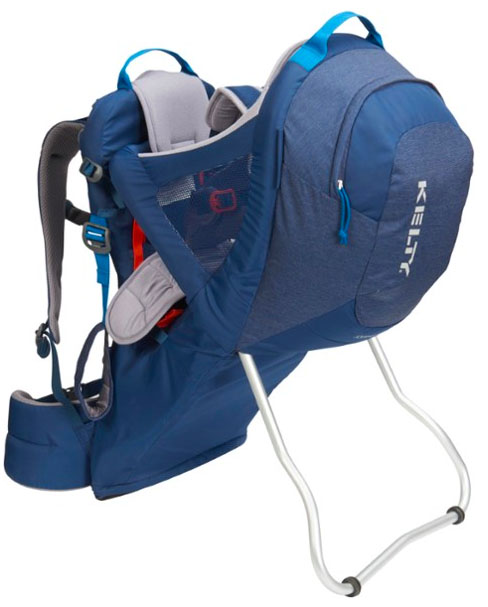 Category: Lightweight/comfort pack
Category: Lightweight/comfort pack
Weight: 6 lb. 6.0 oz.
Capacity: 17L
Sunshade: No (separate accessory)
What we like: Decent price, lightweight, and well-designed child harness.
What we don’t: Low on features compared with the LuvdBaby above.
For shorter hikes or if you’re willing to compromise a little on comfort, Kelty’s Journey PerfectFit is a solid budget baby carrier. What immediately stuck out with the Journey is how well the child harness and interior compare to the more expensive models above. The seat is easy to adjust, nicely padded, and an all-around comfortable place to be for a kid. As a bonus, the Journey PerfectFit saves you a pound or two compared with premium alternatives and has a similar maximum weight capacity.
As mentioned above, the biggest compromise with the Journey is felt on longer trails days. The padding is soft and supportive for short jaunts, but the longer you’re out—and the heavier your kids get—the pack becomes less and less enjoyable. The minimal features also can be an issue here, and we particularly miss having a hydration-compatible sleeve, zippered hipbelt pockets (there is one mesh pocket), sunshade, and better organization from the one main pocket on the pack body. These complaints are enough to drop it down our list—and below the more feature-rich and much cheaper LuvdBaby above—but the Journey is still a perfectly serviceable entry-level design.
See the Kelty Journey PerfectFit
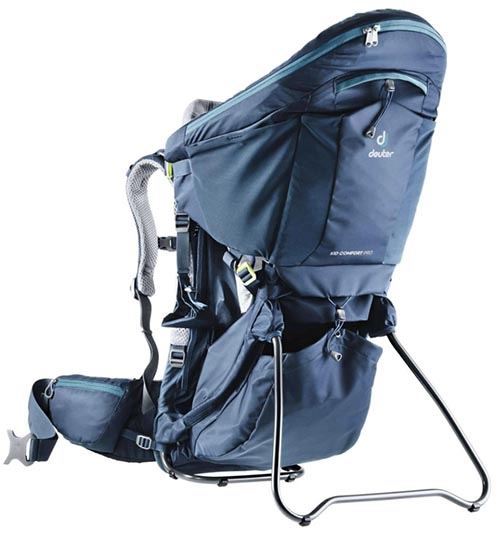 Category: Comfort pack
Category: Comfort pack
Weight: 7 lb. 13.3 oz.
Capacity: 22L (w/removable pack)
Sunshade: Yes
What we like: Same proven Kid Comfort design but with a more protective sunshade.
What we don’t: Bottom compartment isn’t zippered; removable daypack has questionable value.
The third variation of Deuter’s Kid Comfort to make our list is their top-of-the-line Pro model. Coming in at $370, you get the same high-quality carry system and padding as the standard Kid Comfort above along with upgrades like an integrated sunshade and removable daypack. We like the sunshade in particular, which is built into the back of the child seat (the standard Kid Comfort’s shade has to be removed and stored), so it deploys much faster and provides more coverage along the sides. For mid-summer hikes or when the sun is low, we’ve found the added protection to be extremely valuable.
However, a few questionable design choices push the Kid Comfort Pro down in our rankings. For starters, we don’t like that the bottom storage compartment doesn’t include a zipper. The open-top design is far less secure for storing valuables and its plastic clip can be finicky to use. In addition, the removable daypack is quite simple and doesn’t carry a load very well, and unlike the Thule above, it can’t be attached to the pack. Instead, it’s designed to be worn separately, stored in the open-top compartment (which takes up valuable space), or secured at the front (which is awkward while hiking). It’s true that the Pro’s sunshade is more user-friendly, and it’s hard to knock the quality and comfort, but we think you’re better off saving with the mid-range $320 model.
See the Deuter Kid Comfort Pro
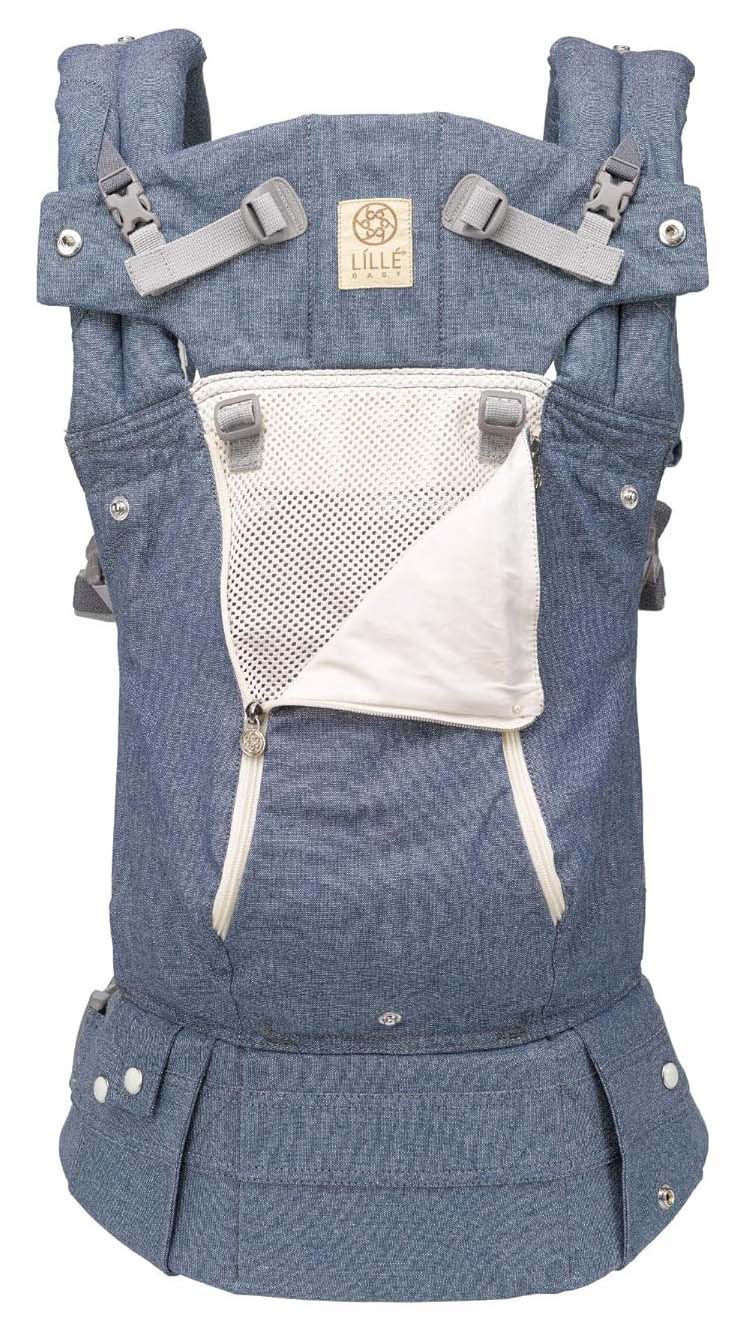 Category: Lightweight pack
Category: Lightweight pack
Weight: 1 lb. 14.0 oz.
Capacity: 0L
Sunshade: Yes
What we like: Works with newborns up to 45 pounds without add-ons.
What we don’t: Runs warmer than the Ergobaby 360.
Like the Osprey Poco Soft and Ergobaby 360 Mesh above, Líllébaby’s Complete 6-in-1 All Seasons carrier is a lightweight, frameless pack intended for short family adventures. The versatile design includes a small pocket and a zippered panel that allows you to adjust ventilation depending on the conditions—on warm days or if you and the baby are starting to overheat, you can unzip the solid fabric along the front to expose the mesh lining underneath. While it’s still not as cool as the Ergobaby, and we wouldn’t recommend it for strenuous summer hikes, the All Seasons excels in mild climates and when snowshoeing in winter.
How does the Líllébaby Complete compare with Ergobaby’s popular 360 Mesh? Both include a sun cover and offer a variety of carrying positions (front, side, and back), but the Líllébaby has a wider size and weight range. Out of the box, the All Seasons is set up to accommodate newborns down to 7 pounds, while the 360 Mesh requires a separate infant insert for babies younger than approximately four months. That said, as we touched on above, the Ergobaby has the clear edge in ventilation for summertime hiking, which is arguably its most important function. If you’ll be spending a lot of time in hot weather and like the Lillebaby Complete design, check out their all-mesh Airflow model.
See the Líllébaby Complete All Seasons
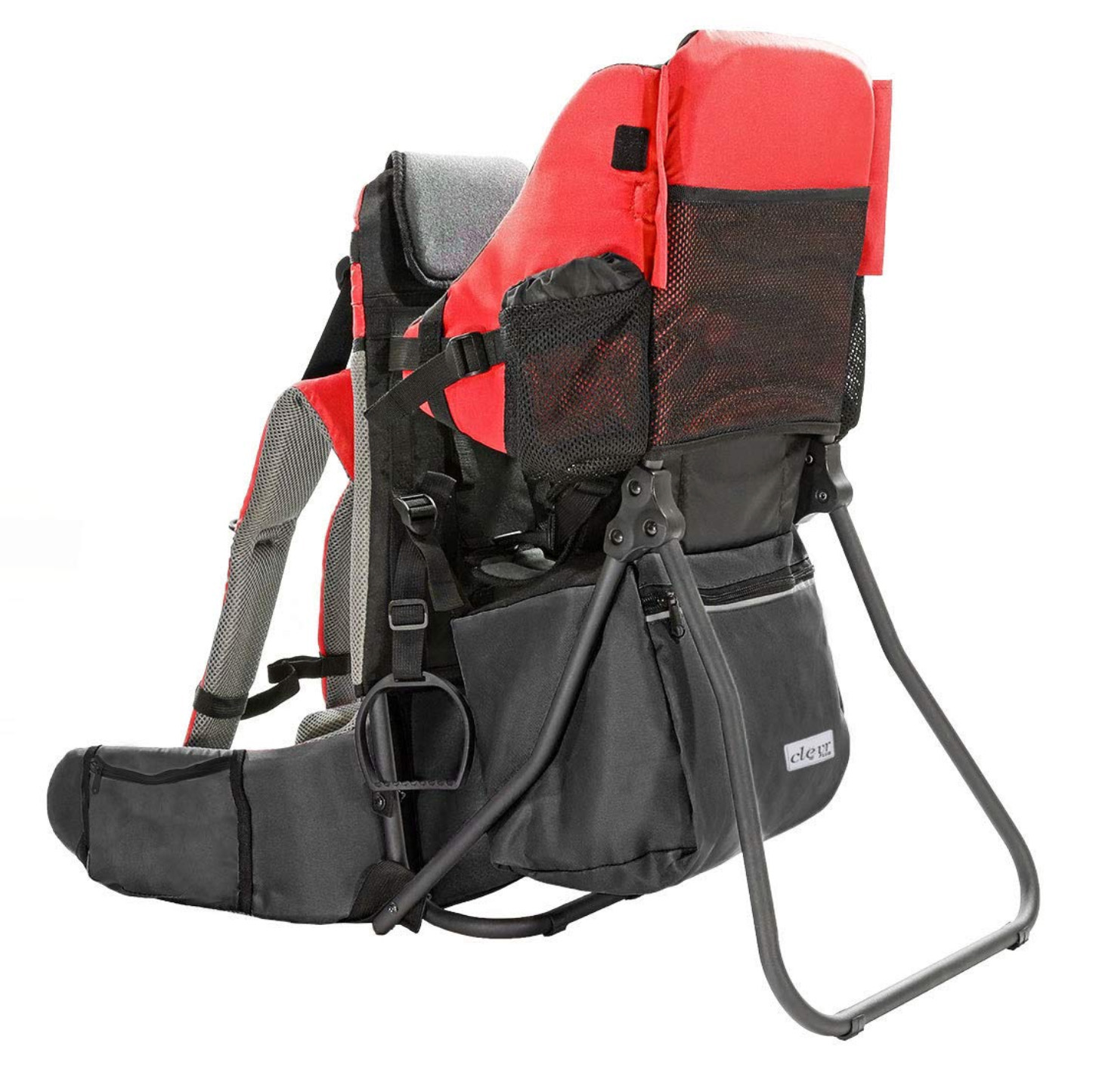 Category: Lightweight/comfort pack
Category: Lightweight/comfort pack
Weight: 5 lb. 8.0 oz.
Sunshade: Yes
What we like: Budget price and includes extras like a sunshade.
What we don’t: Cheaply made with a noticeable drop in comfort.
The name and generic styling may not make a strong first impression, but the ClevrPlus Cross Country Child Carrier is our favorite child carrier pack in the $100 price range. Most impressive is the number of extras you get at this price—it includes a sunshade that also provides decent rain protection with its clear plastic sides, a stable kickstand, and a good array of pockets. The pack won’t blow you away with the quality of the materials—and longevity is impacted by the cost-cutting, which is a consideration if you plan to use the ClevrPlus with multiple kids or hand it down. But you’re not sacrificing as much as you’d think for a $105 baby carrier.
The drop in comfort and finicky sizing adjustments are what hurt the ClevrPlus Cross Country on our list. The padded hipbelt and shoulder straps are noticeably cheaper than our top-rated models, and the pack isn’t comfortable on anything more than a short hike. And for those who share carrying duties, the ClevrPlus doesn’t have the same level of fit customization and can feel unwieldy for shorter adults. The good news is that these complaints don’t matter very much if you’ll be on the trail for short stretches. For the occasional hour-or-two family hike, the ClevrPlus Cross Country is a nice budget option.
See the ClevrPlus Cross Country Child Carrier
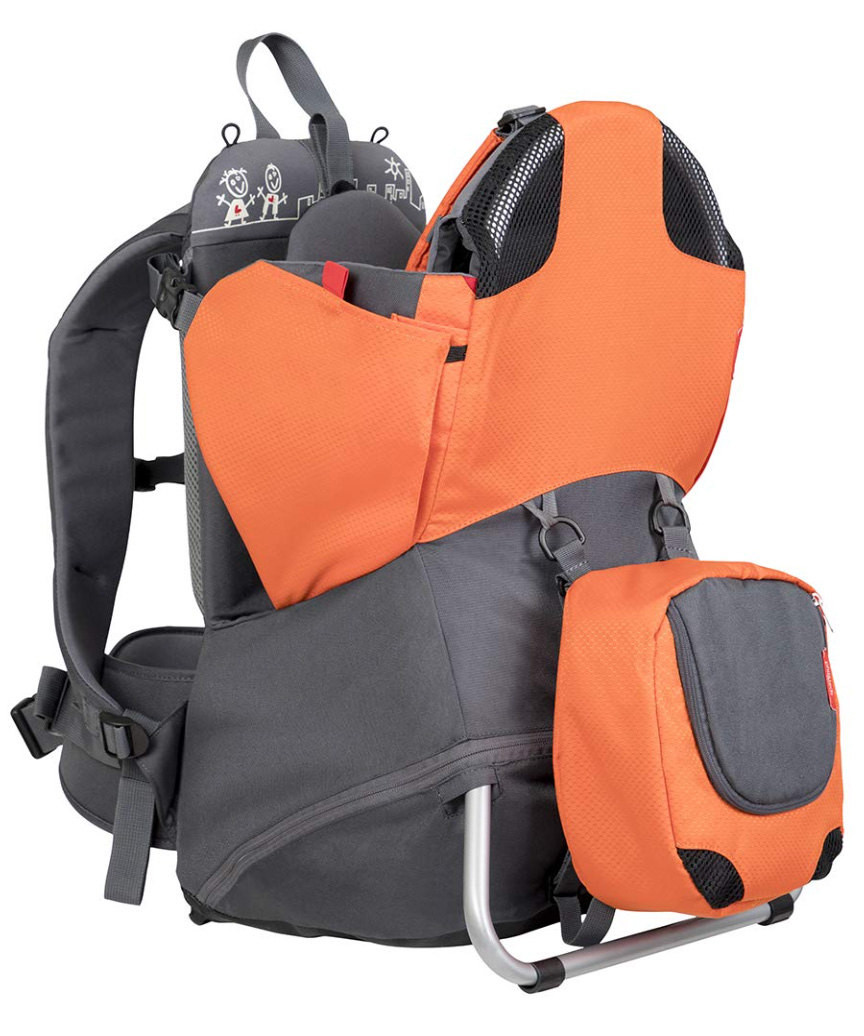 Category: Lightweight pack
Category: Lightweight pack
Weight: 4 lb. 0 oz.
Sunshade: No
What we like: Simple build and folds down flat.
What we don’t: Low on features and comfort.
Phil & Teds’ lightweight Parade pack is a great option for travel or quick family adventures. Resembling a compact daypack, the Parade has an aluminum frame and adjustable harness system that provides sufficient support. It’s not something you want on your back for hours at a time, but the minimalist design is easy to carry and folds flat—small enough to fit as a carry on for most airlines. The Parade also is a fairly good value at $140.
In keeping things simple, however, the Parade is less appealing for hiking trips. There is hardly any storage, and the detachable mini backpack, while a fun idea for allowing kids to have a pack of their own, isn’t very functional. In addition, the hipbelt and shoulder straps aren’t comfortable for anything more than a short walk. But if you stick to the Parade pack’s around-town and travel intentions, it’s a decent option that won't break the bank.
See the Phil & Teds Parade
| Pack | Price | Category | Weight | Capacity | Sunshade | Max Weight |
|---|---|---|---|---|---|---|
| Deuter Kid Comfort | $320 | Comfort | 7 lb. 1.9 oz. | 14L | Yes | 48 lb. 8 oz. |
| LuvdBaby Toddler Carrier | $175 | Comfort/lightweight | 6 lb. 7.0 oz. | Unavail. | Yes | 40 lb. |
| Osprey Poco Premium | $395 | Comfort | 8 lb. 5.4 oz. | 36L | Yes | 48 lb. 8 oz. |
| Osprey Poco LT | $295 | Lightweight/comfort | 5 lb. 9.0 oz. | 25L | Yes | 48 lb. 8 oz. |
| Osprey Poco Soft | $135 | Lightweight | 1 lb. 10.9 oz. | 0L | Yes | 33 lb. |
| Deuter Kid Comfort Active | $270 | Comfort/lightweight | 5 lb. 14.6 oz. | 12L | No | 48 lb. 8 oz. |
| Kelty Journey PerfectFit Elite | $380 | Comfort | 7 lb. 4.0 oz. | 26L | Yes | 50 lb. |
| Thule Sapling | $380 | Comfort | 7 lb. 0 oz. | 22L | Yes | 48 lb. |
| Osprey Poco | $350 | Comfort | 7 lb. 11.0 oz. | 24L | Yes | 48 lb. 8 oz. |
| Ergobaby 360 Mesh | $149 | Lightweight | 1 lb. 8.0 oz. | 0L | Yes | 45 lb. |
| Kelty Journey PerfectFit | $270 | Lightweight/comfort | 6 lb. 6.0 oz. | 17L | No | 50 lb. |
| Deuter Kid Comfort Pro | $370 | Comfort | 7 lb. 13.3 oz. | 22L | Yes | 48 lb. 8 oz. |
| Líllébaby Complete 6-in-1 | $120 | Lightweight | 1 lb. 14.0 oz. | 0L | Yes | 45 lb. |
| ClevrPlus Cross Country | $105 | Lightweight/comfort | 5 lb. 8.0 oz. | Unavail. | Yes | 40 lb. |
| Phil & Teds Parade | $140 | Lightweight | 4 lb. 0 oz. | Unavail. | No | 40 lb. |
It’s no secret that hiking is a favorite activity among all of the Switchback Travel staff—after all, it's one of the easiest and most approachable ways to enjoy the great outdoors. Former editor-in-chief John Ellings put together our initial list of 14 baby carrier packs in 2017. An avid outdoor-goer and father of two, John put in tons of time on the trail with carriers of all shapes and sizes to narrow down the list based on his and his family’s experiences. Founder David Wilkinson also helped fill in the gaps based on his own outdoor adventures with his wife and two kids throughout Washington and Colorado. Now, our team jointly manages the guide, soliciting feedback from gear-savvy parents and researching the market extensively to ensure the list above stays fresh and comprehensive.
Our lineup now includes 15 trail-ready child carrier packs chosen based on tons of research, hands-on testing, and feedback from our readers and community (and—of course—their kids). Testing these packs involves assessing the details of what materials are used, which features are included, and how well each pack carries a full load. We also consider weight, fit adjustability, and ventilation, prioritizing packs that hit a nice balance between price and on-trail performance. As the market continues to evolve, rest assured we will keep putting new and noteworthy designs to the test to showcase our favorites above.
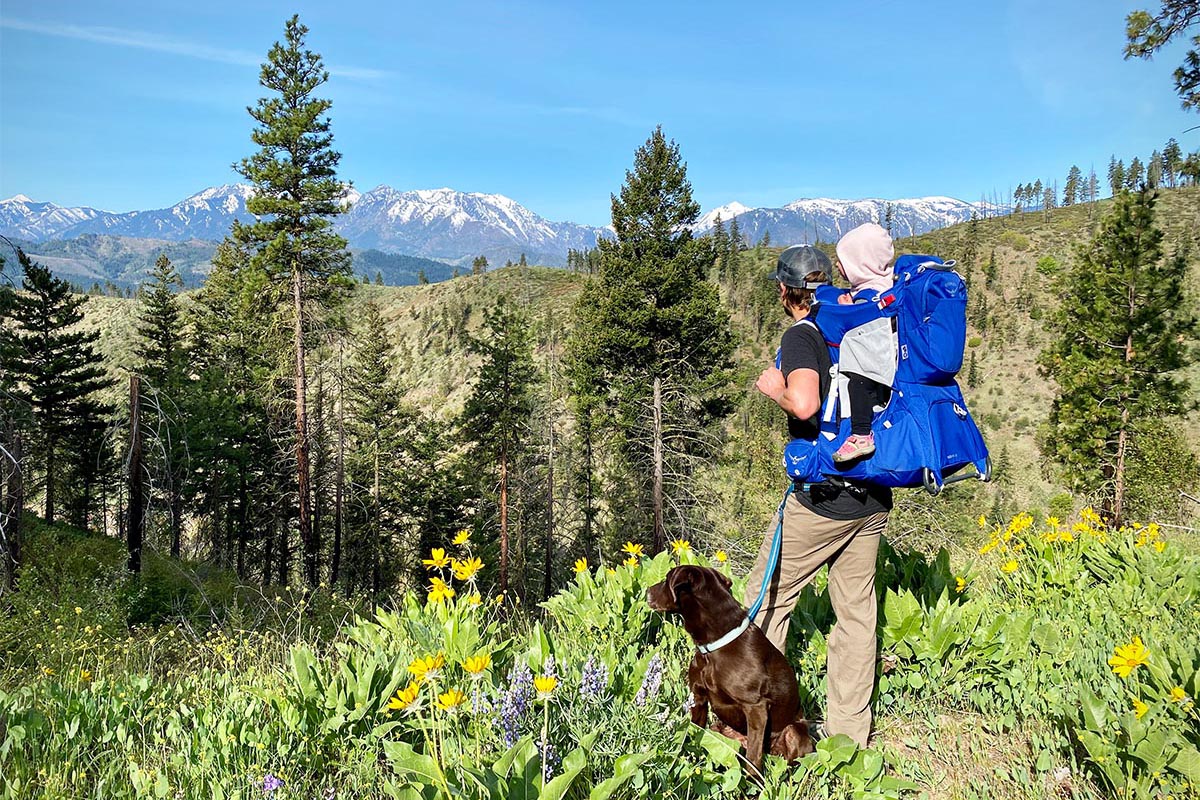
Comfort Packs
Packs that fall into our “comfort” category are just that: comfortable and feature-rich designs. Most follow a basic formula that resembles a backpacking pack with an open cockpit for a child to sit in. Their strong metal frames provide excellent support for hauling a toddler (many are rated for up to 50 lb. total) and include a number of pockets for carrying multiple hours' worth of essentials. These are heavy items, and even with their folding kickstands take up a noticeable portion of a trunk or closet. But for those who plan to get out hiking a lot with their little ones, a comfort pack like our top-rated Deuter Kid Comfort is what we recommend.
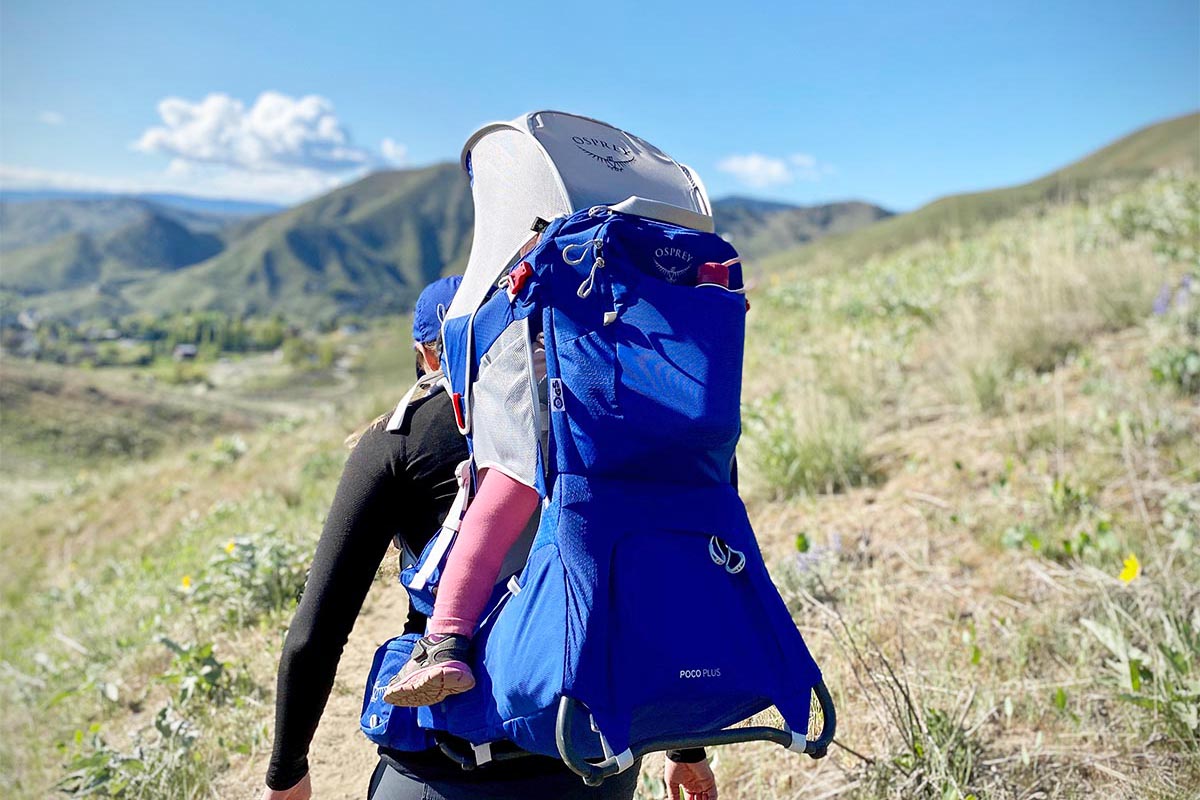
Lightweight Packs
Lightweight packs trim bulk and features from comfort-oriented designs and are a great option for short trips and use around town. The biggest upside is their significantly smaller size and lighter weight that’s easier to carry, store, and transport in a car. Lightweight pack options range from the Phil & Teds Parade, which resembles a shrunken-down version of a comfort pack, to the frameless and minimalist Ergobaby. What you give up with a lightweight pack is storage and often carrying comfort. They’re great for quick jaunts, but for longer day hikes, we find it well worth the upgrade to a comfort pack.
Comfort is a big factor in how often you get out on the trail, so we’ve put a high value on it in our rankings. The packs that excel in this category have strong suspensions to handle anything from a 16-pound baby up to a 40-pound toddler. The hipbelt plays an important role in this, and we look for padding that molds to your hips and provides enough firm support (overly soft cushioning typically isn’t as comfortable over the long haul). You can certainly skimp on carrying comfort if you stick to short hikes, and in those cases, any of the packs that made our list will do the trick. But we like the flexibility to spend more than a couple hours on the trail, which is why we put Deuter’s very comfortable Kid Comfort at the top of our list.
A secure child harness and seat is a prerequisite to making our list, and all of the major players provide plenty of support, adjustability, and comfort around the arms, shoulders, and legs. More expensive baby carrier models make greater use of soft touch fabrics, but even long stretches of hiking with a budget-friendly pack like the Kelty Journey PerfectFit hasn’t led to any complaints. In terms of ease of use, we’ve found that the high placement of Osprey’s harness is a standout, but we consider harness design to be a strong suit for all the products featured above.
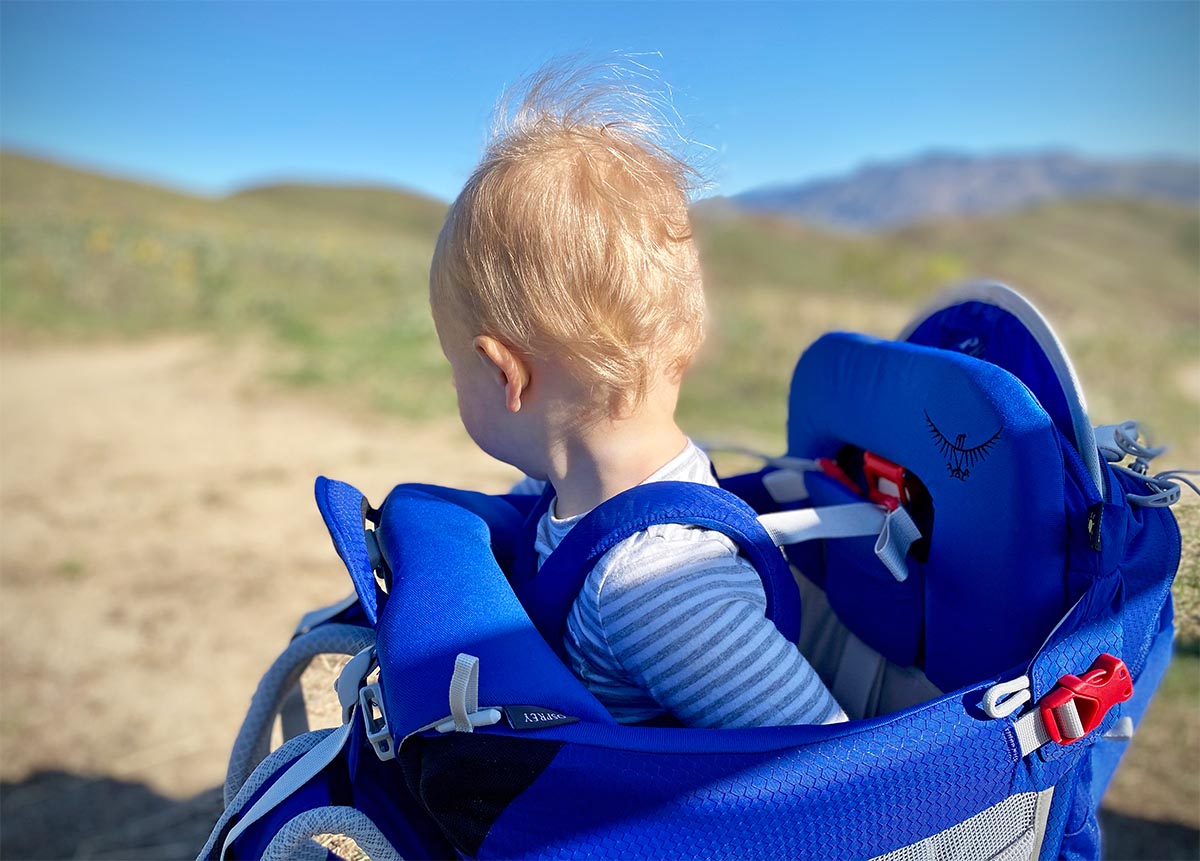
In the product descriptions above, we make a number of references to the child’s cockpit area. While it’s a bit of a funny term, this refers to the space surrounding the baby while they’re seated in the pack. A well-designed cockpit like Deuter’s Kid Comfort has a tall back and sides and a large, cushioned pad in the front, which makes it a comfortable place for children if they fall asleep. This is one area where lightweight packs make some sacrifices, as children typically sit very high in the seat and end up in funny, contorted positions if they drift off for a nap.
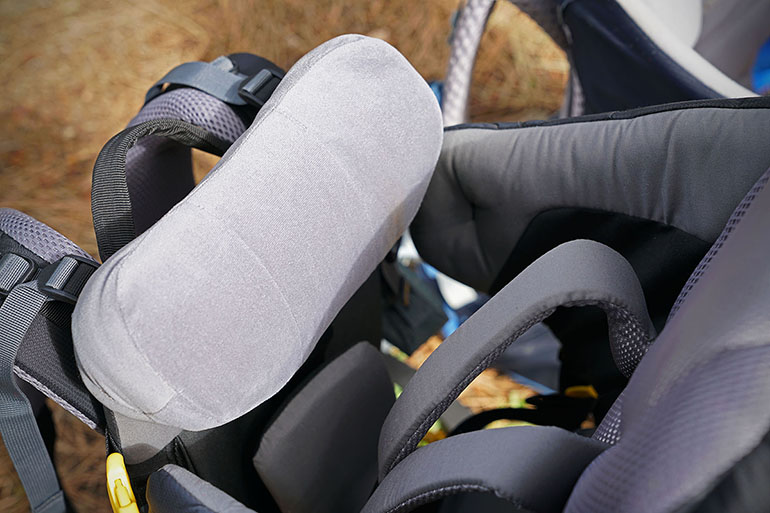
Hiking and even walking around town can lead to a lot of sun exposure for a baby, so all major carriers either include or offer a sunshade with their packs. We find them to be absolutely mandatory for protecting that sensitive baby skin. The built-in designs are typically stored right behind the cockpit area and can be quickly deployed. And the accessory sunshades are just about as easy to connect and use (and some have dedicated storage pockets, like Deuter's Kid Comfort).
None of the packs listed above come with a dedicated rain cover—although all of the sunshades will provide a degree of protection against rain—but Osprey, Thule, and Deuter do offer separate covers for purchase. Rain covers are differentiated from sunshades by their water-resistant coatings and greater side, back, and front protection. They do not ventilate very well, so they’re not as helpful in hot climates, but rain covers are nice backups to have in case of a surprise storm. Expect to pay $30 to $45 for a manufacturer-specific design.
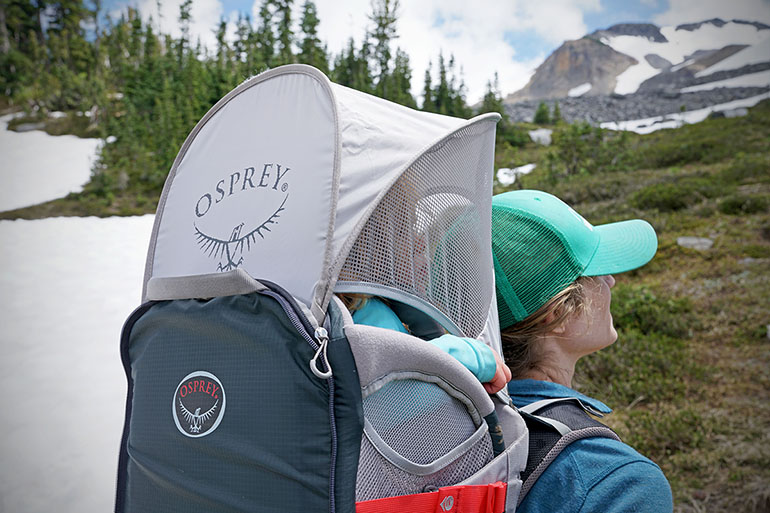
The empty weight of a pack may not be the first thing you check on when researching baby carrier packs—it certainly wasn’t for us—but there are significant differences to be aware of. Packs in our lightweight category are usually around 4 to 5 pounds, while comfort-oriented models can reach 8 pounds and more. Tack on the child in the pack, and anything else you’re carrying, and your total weight is equivalent to or even more than a loaded backpacking pack. Unfortunately, this is mostly unavoidable as the most comfortable packs are by far and away the heaviest (Deuter’s 5-lb.-14.6-oz. Kid Comfort Active is one exception, but it’s low on features). Consider it a nice way to get or stay in shape.
If multiple adults will wear the baby carrier, a highly adjustable fit system can be an important feature. In particular, your pack will need a wide enough torso range to be comfortable for all users. Premium, comfort packs like the top models from Deuter, Thule, Osprey, and Kelty are standouts in this respect, giving close fits for most people. Taking it a step further, Osprey's Poco Premium allows you to shorten or lengthen the padded portion of the hipbelt, which guarantees the cushioned areas are supporting you correctly. On the other end of the spectrum, budget-oriented packs don’t offer as high of levels of customization. This is one notable downside of the ClevrPlus Cross Country pack, for example, which doesn't allow for precise adjustments and is less comfortable as a result.
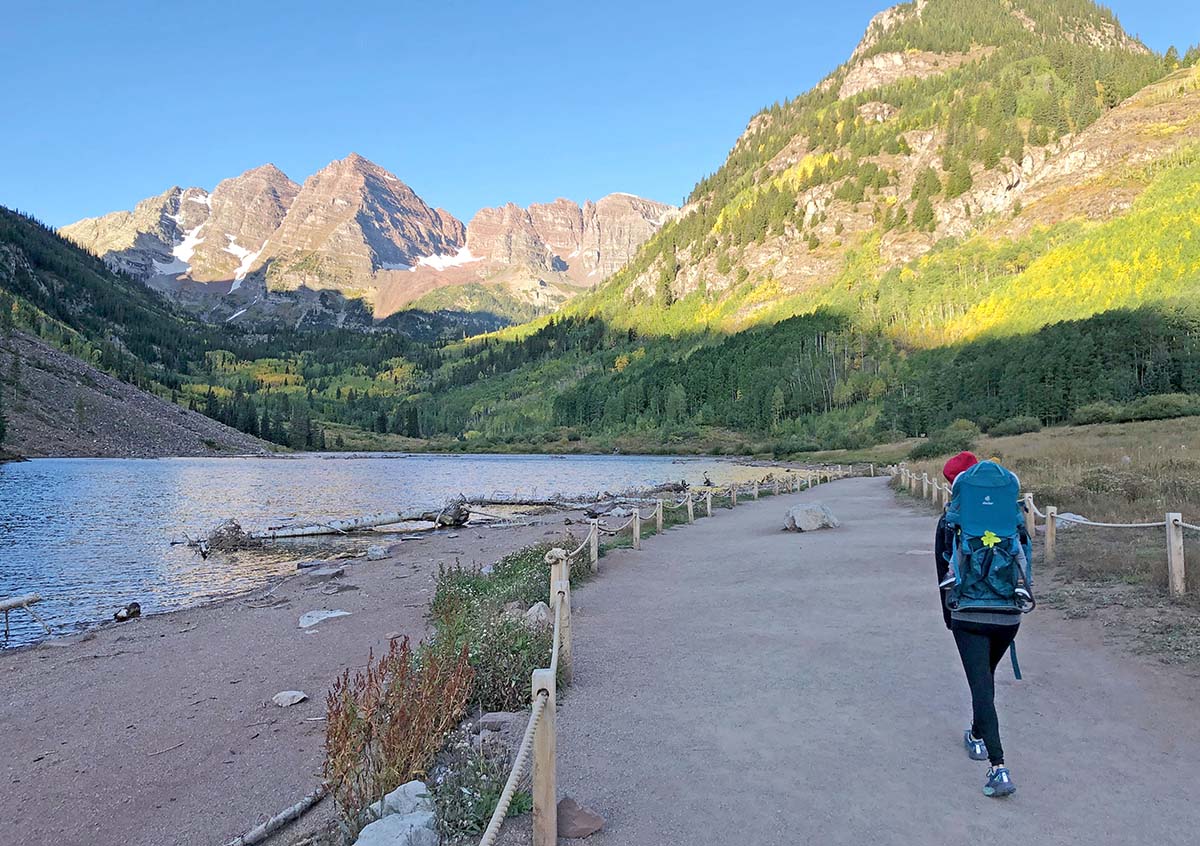
Outside of minimalist designs like the Osprey Poco Soft, Ergobaby 360 Mesh, and Líllébaby Complete 6-in-1 All Seasons, baby carrier packs include an array of pockets for organization and storage. The primary storage in most packs is at the front, with one or two pockets along the top and a larger, zippered pocket at the bottom. We appreciate a range of pocket sizes to make it easy to distribute items we want close at hand, and large hipbelt pockets are great for storing snacks to keep your little one happy. As with most features, organization improves as price goes up, but most packs on our list have a functional pocket design.
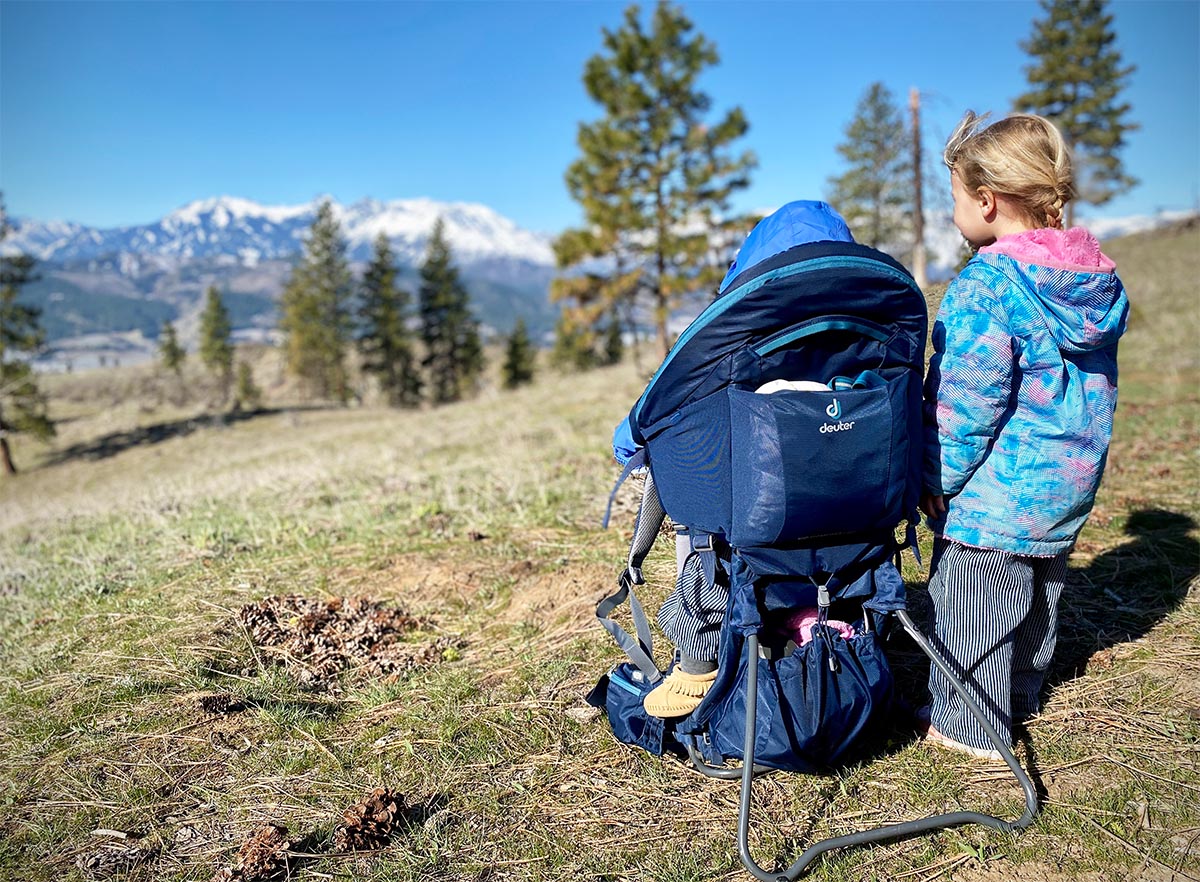
In addition to the number and placement of pockets, overall capacity can be an important storage consideration. From our list above, packs that come with pockets range from 12 liters to 36 liters in volume. There are a number of factors that will decide your ideal capacity—including how long you’ll be out, time of year and weather, and if you’ll be sharing hauling duties—but we’ve found that 15 liters is often plenty for most hiking trips. For those who need to carry a lot of extras, Osprey’s Poco Premium (36L) and Kelty's Journey PerfectFit Signature and Elite (both 26L) are class leaders.
A baby carrier pack’s ventilation is a two-part assessment: the ventilation along the backpanel for the adult and around the child’s seat. Ventilation for the baby is usually pretty good: The openings at the top and sides do a good job moving air, and there’s enough space that they don’t get too much of your body heat. But there are more substantial differences in backpanel design. The best back breathers are packs with a full mesh panel, including the Osprey Poco. Deuter’s Kid Comfort Active takes it a step further and uses mesh all around the child’s harness and cockpit. While these models offer impressive ventilation, unless you’re really particular about a sweaty back or live in a hot climate, we’ve found most packs are acceptable in almost all conditions.
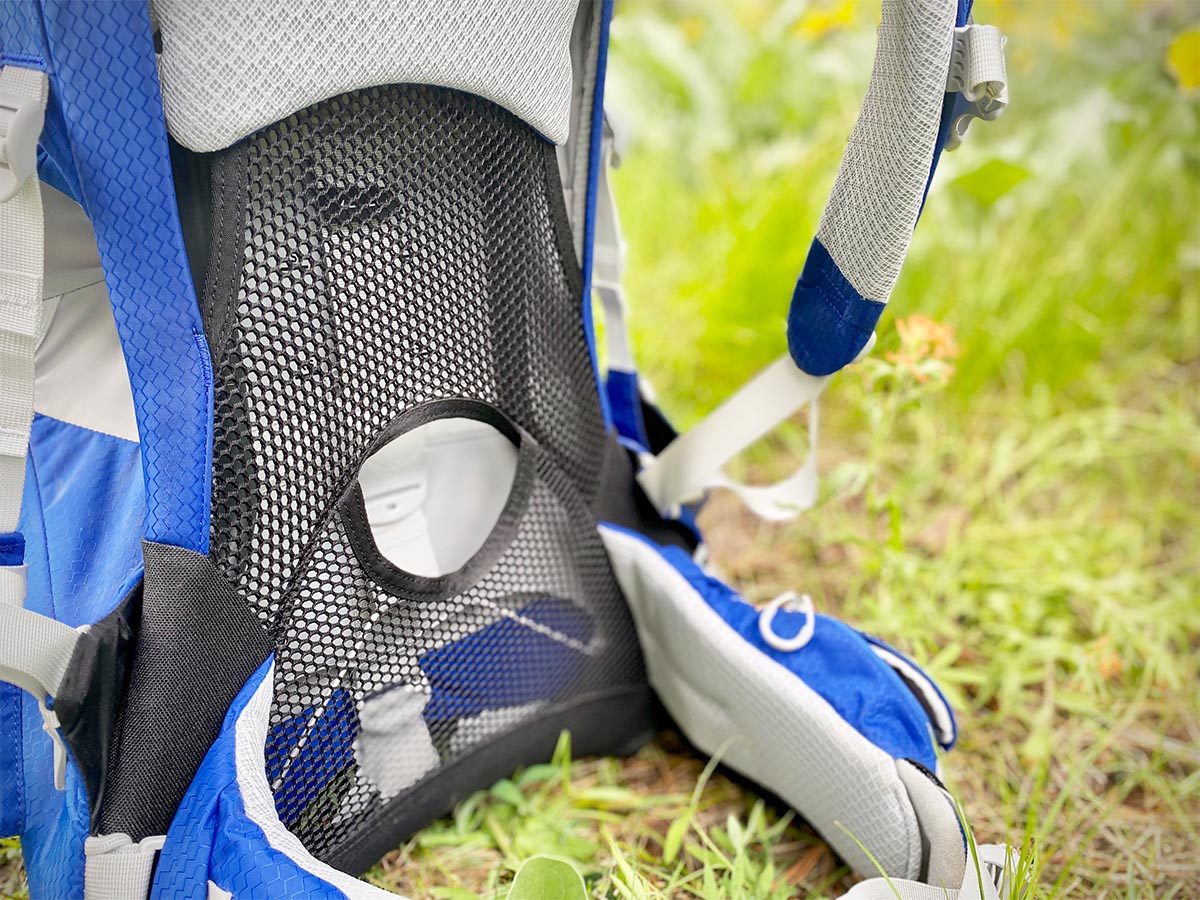
Water Storage
As with any pack used for hiking, water storage is an important consideration for a baby carrier. Due to the space taken up by the child seat, you won’t find an array of mesh side pockets that will fit something as large as a Nalgene bottle. We often have to fit ours inside the pack, which can be a pain because you’ll need to either ask for help or completely remove the pack to access the water. Thankfully, many child carriers over $250 include a hydration sleeve, so you can slide in a water reservoir and drink tube for water on the go. For longer day hikes, this is our preferred hydration option.
Removable Daypacks
At the upper echelon of the market are baby carrier packs that include zip-off daypacks. Thule and Deuter have this design feature on their top-tier models that cost $350 or more (note: Thule's Sapling Sling Pack is sold separately). The main benefits of a removable pack are a larger carrying capacity as well as the option to split up the hauling duties with another person (additionally, you can attach the daypack that comes with Deuter's Kid Comfort Pro to the shoulder straps for easy access). In some cases, we appreciate the all-in-one design, but many hikers will be just fine saving a few dollars and using one of their own daypacks instead. The zip in and out feature is nice, but the simplistic packs usually aren't anything special.
Stirrups (Foot Rests)
Another notable feature is stirrups on either side of the child seat. These are intended for toddlers or older babies to get them in a proper sitting position or take some of the pressure off resting in the child’s seat for hours at a time. While it’s certainly not an essential item, and we’ve found the footrests can be hit or miss depending on the child, it’s a nice thing to have if you’ll be out on longer trips. And in most cases, the stirrups are removable, so you can store them away until your child is old enough or interested in using them.
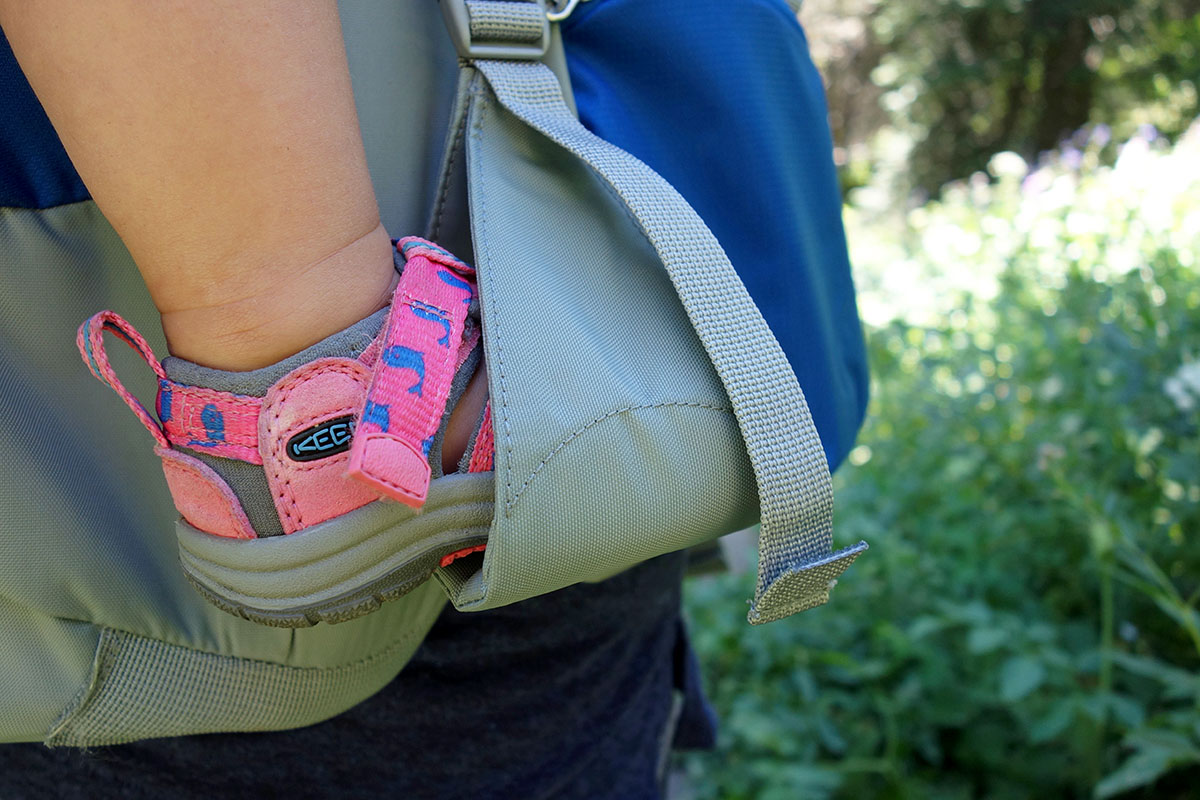
If you’re like a lot of outdoors-minded parents, you’re pretty excited about getting your baby out on a hike. You can certainly get started at a young age with an option like the Ergobaby 360 Mesh or a similar product that provides sufficient neck and head support, but there are some specific recommendations for using a dedicated child carrier pack. Because children develop at different rates, most manufacturers stick to recommending a minimum weight of 16 pounds and that the child can support their head for extended stretches while in the pack. This will vary slightly, so be sure to check the specific instructions on your pack and ensure the harness can cinch down small enough to safely hold your child. The maximum weight capacity also will vary depending on the design but typically is around 30 to 50 pounds. And be sure to note the maximum weight factors in the pack itself as well as any gear stored inside.
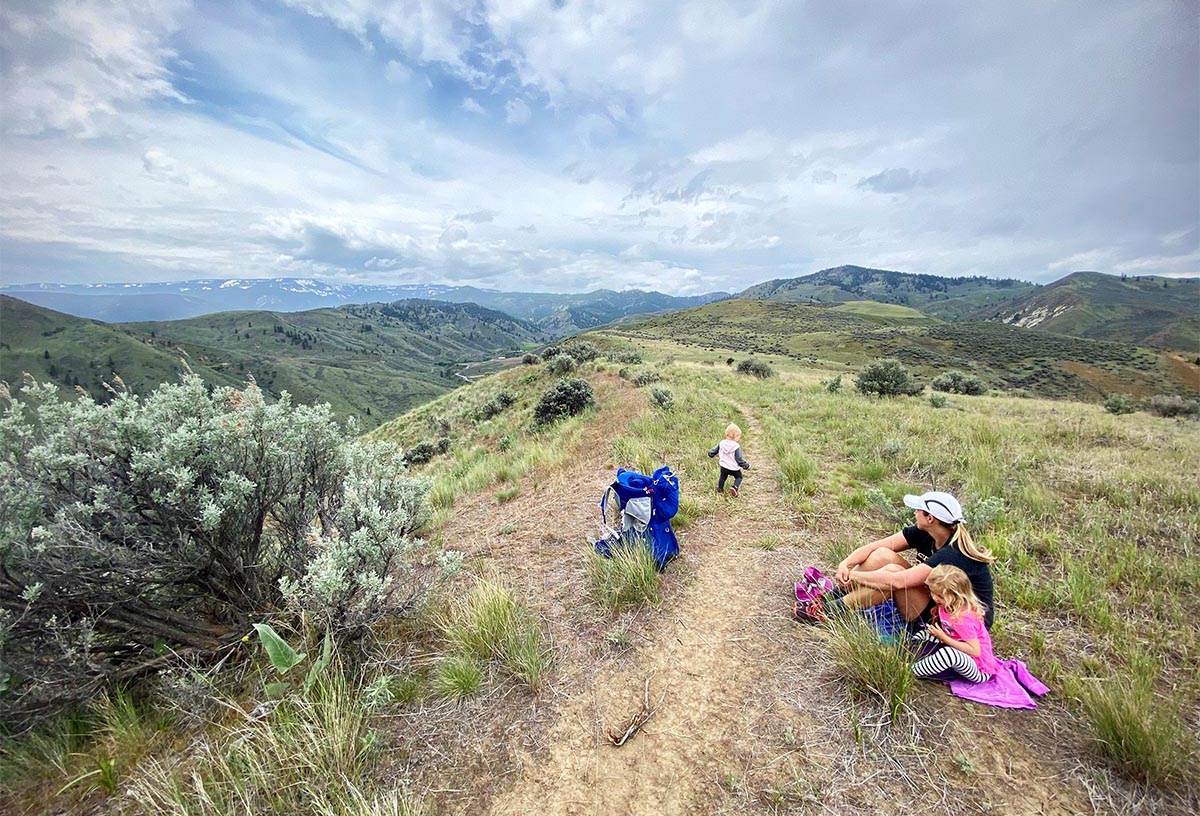
All child carriers sold in the United States have to adhere to the Frame Child Carrier Standard from the Consumer Product Safety Commission, which prohibits hazards like sharp edges, exposed springs, and unintentional folding. Taking it a step further, you’ll see some packs reference a JPMA safety certification, which means they have gone through a separate testing process through an independent third party. These tests ensure the packs follow ASTM, state, and federal restrictions (for more information, see JPMA’s website). While getting a JPMA certification does not mean that a certain pack is safer than other packs on the market—and there are other global testing standards like TÜV for Deuter in Germany—it is nice to see that some are taking this voluntary step.
Our impact on the environment has never been of greater concern, and it’s nice to see gear companies step it up with more sustainable practices. The use of recycled fabrics has grown substantially in the past few years, although child carrier packs have lagged behind the backpacking and hiking daypack markets in this respect (likely due to the slower turnover in designs). Osprey and Thule are current leaders here, with recycled nylon featured on all of their offerings above, including the Poco, Poco LT, Poco Premium, and Sapling Child Carrier.
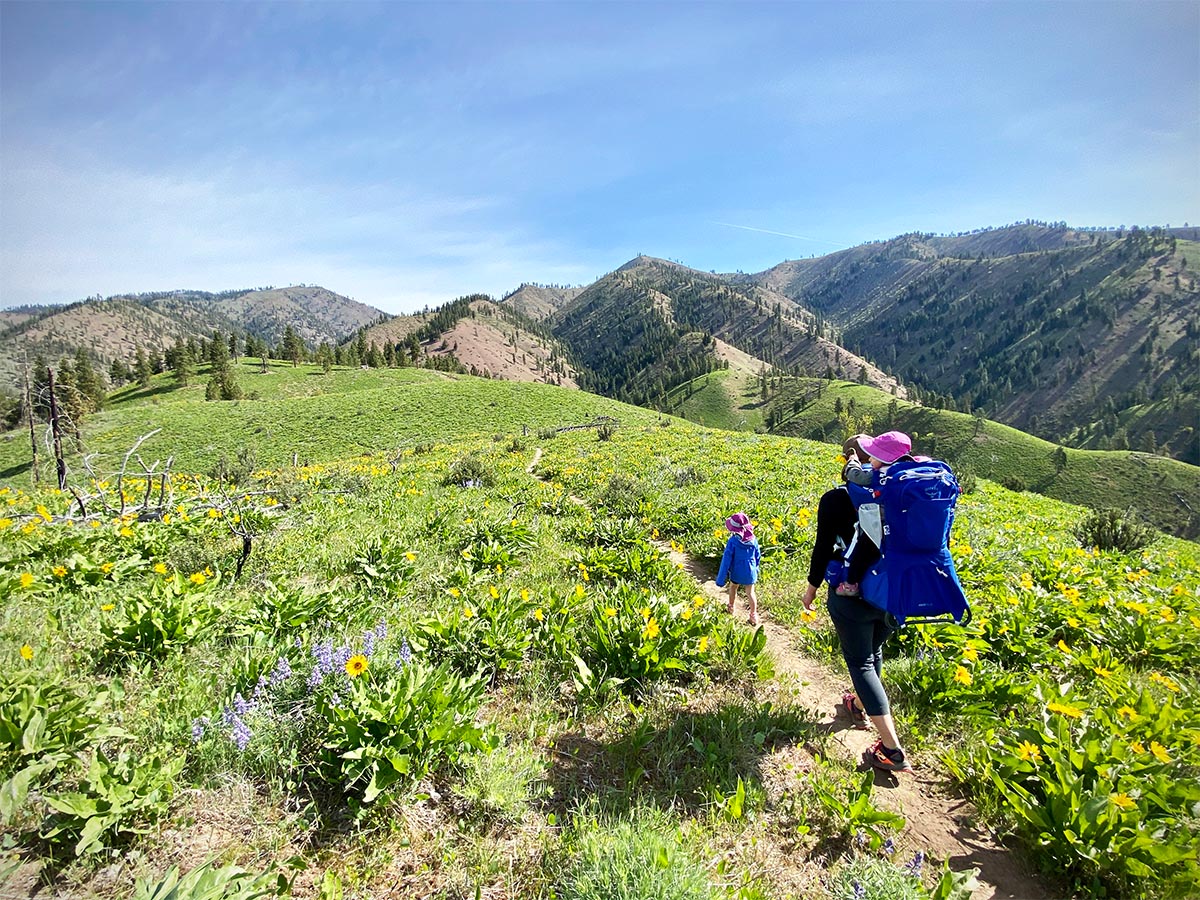
Additionally, we're seeing a lot more PFAS-free durable water-repellent (DWR) finishes on products recently released or updated, which eliminate the use of some—or at times, all—per- or polyfluorinated chemicals (these “forever chemicals” have been linked to a range of environmental and health issues). And finally, Osprey and Thule have bluesign-approved materials on some of their packs, which is a supply chain certification that indicates the products are safe for workers, consumers, and the environment.
Back to Our Top Baby Carrier Picks Back to Our Baby Carrier Comparison Table